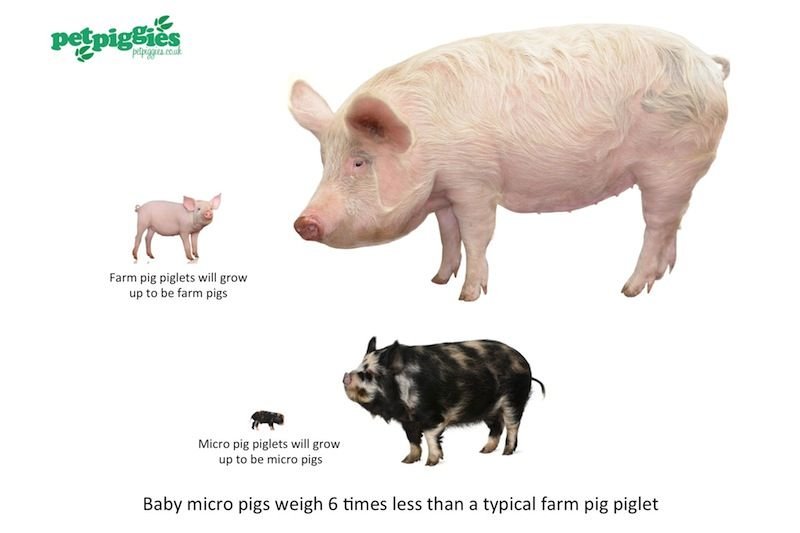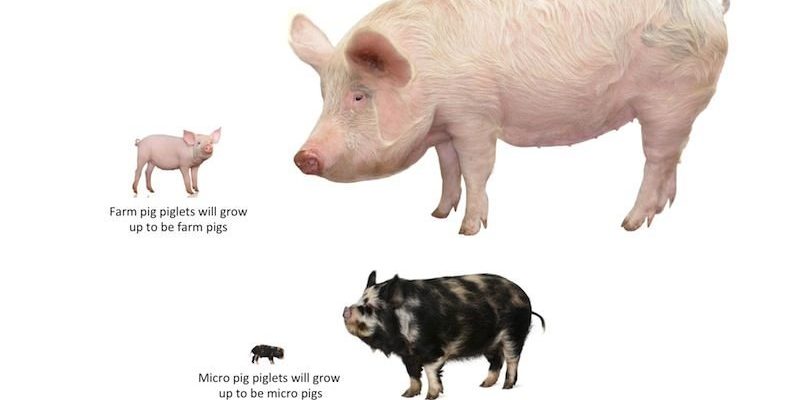
Think of it like comparing apples and oranges; they’re both fruit, but they serve different purposes and have unique traits. A farm pig is like that friend who loves to eat, lounge around, and enjoy life’s simple pleasures, while a mini pig is more like the trendy little sidekick everyone wants to take home. Let’s break it down so you can get a good grasp of what makes these two types of pigs so distinct.
Understanding the Basics: What is a Mini Pig?
Mini pigs, often referred to as teacup pigs or micro pigs, are bred specifically to be small in size. When fully grown, these tiny companions generally weigh between 50 to 150 pounds, depending on the breed. That’s a far cry from their farm friends! Think of mini pigs as compact bundles of joy wrapped in soft, curly fur.
They’re generally friendly and intelligent, which makes them appealing as pets. Mini pigs thrive on interaction and can even be trained to do tricks or use a litter box, just like dogs. However, it’s essential to remember that they still have specific needs and can live for 12 to 20 years. So, if you’re considering adding one to your family, be ready for a long-term commitment!
Farm Pigs: Size and Characteristics
Now, let’s chat about farm pigs. These pigs are typically raised for meat and can vary significantly in size. Most farm pigs, like the common *Yorkshire* or *Duroc*, can weigh anywhere from 200 to over 1,000 pounds! That’s quite a difference, right? They have a sturdy build, making them well-suited for life in the fields.
Farm pigs are also social animals but have different social needs compared to mini pigs. They thrive in groups and often spend their days rooting around in the dirt, searching for food and socializing with other pigs. Their size and social nature means they require more space than mini pigs, further highlighting the importance of understanding their care needs.
Size Differences: What to Expect
The size difference between mini pigs and farm pigs is one of the most striking features. Here’s a quick breakdown of their sizes:
| Type of Pig | Average Weight | Typical Height |
|---|---|---|
| Mini Pig | 50-150 pounds | 12-16 inches |
| Farm Pig | 200-1000+ pounds | 24-36 inches |
With mini pigs, you can pick them up and carry them around, while farm pigs are more of a two-person job if you’re trying to move them. You might be wondering about the implications of this size difference when it comes to care. Well, it plays a significant role in how much space, food, and exercise they need.
Living Space Requirements
When it comes to living arrangements, mini pigs and farm pigs have different requirements. Mini pigs can adapt to smaller homes or apartments, provided they have space to roam and play. Ideally, they need a secure yard with fencing, as they’re quite curious and clever.
Farm pigs, on the other hand, require a lot more room. They need to roam and explore in a pasture or a large enclosure; they simply can’t thrive in a backyard setting. For farm pigs, social interactions with other pigs are essential for their well-being. They need enough acreage to run, dig, and engage in natural behaviors.
So, choosing between a mini pig and a farm pig also means considering your living situation and how much space you can provide.
Feeding and Nutritional Needs
Feeding is another area where mini pigs and farm pigs diverge significantly. Mini pigs have specific dietary needs to ensure they stay healthy and don’t become overweight. They require a diet rich in vitamins and minerals, but it’s essential to control their portions. Many mini pig owners opt for specially formulated pig feed along with fresh fruits and vegetables.
On the flip side, farm pigs will eat a lot more! Their diets can consist of grains, soy, and vegetables, designed to help them gain weight and grow quickly. Due to their size and weight gain goals, farm pigs typically eat larger quantities compared to mini pigs. The dietary choices reflect their different roles, highlighting the importance of understanding nutritional needs.
Health Care Considerations
When considering a mini pig vs. farm pig, understanding their health care needs is crucial. Mini pigs require regular veterinary check-ups, vaccinations, and spaying or neutering procedures. Obesity can be a concern for mini pigs, so keeping an eye on their weight is essential, as it can lead to health issues down the road.
Farm pigs also need veterinary care, but their health concerns can differ. They might be more prone to certain diseases due to their size and farming conditions. Regular vaccinations, parasite control, and hoof trimming are essential for keeping farm pigs healthy. They also benefit from being in a clean, spacious environment to prevent illnesses.
Social Needs and Behavior
Both mini pigs and farm pigs are social creatures, but their social needs can vary quite a bit. Mini pigs often bond closely with their human companions and thrive on affection and interaction. They can get lonely without a buddy, so many owners choose to adopt more than one.
Farm pigs, on the other hand, are very social animals and do best in groups. They’re known to develop strong bonds with other pigs and can become stressed or depressed if isolated. If you’re thinking of having farm pigs, expect to invest time and effort into creating a supportive social environment for them.
So, which pig is the right fit for you? It ultimately depends on your lifestyle, space, and commitment level. Mini pigs are perfect for those seeking a smaller, more manageable pet. They’re great companions and can easily be integrated into family life.
Farm pigs, however, require more space and social interaction, making them more suitable for those with ample land and the resources to care for them properly. Whichever type of pig you choose, being informed about their needs will lead to a happier, healthier life for your porcine friend. Remember, both mini pigs and farm pigs bring joy, laughter, and a bit of mischief into your life—so it’s all about what fits best in your world!

